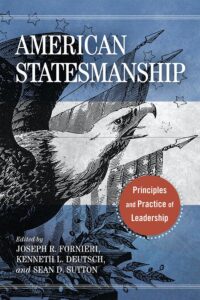A new book of essays on statesmanship in American history features chapters on Richard Nixon by David Frisk, Resident Fellow, The Alexander Hamilton Institute for the Study of Western Civilization (AHI) and on John C. Calhoun by AHI Senior Fellow Lee Cheek of East Georgia State University.
American Statesmanship: Principles and Practice of Leadership, published this month by the University of Notre Dame Press, was co-edited by another scholar connected with AHI: Joseph Fornieri of the Rochester Institute of Technology (RIT). Dr. Fornieri directs the AHI-affiliated Center for Statesmanship, Law, and Liberty on RIT’s campus.

The late political scientist Kenneth Deutsch, a co-editor of the volume, explains that American Statesmanship examines “some of the most significant leaders in American history in terms of the nature, virtue, and task of statesmanship.” Each of them is judged by the author as being either “more or less statesmanlike.”
Acknowledging the variety of opinions about the diverse range of figures whom the authors discuss, Deutsch adds: “The inclusion of some leaders and the omission of others will always be a matter of debate. While the editors do not necessarily share the views of the contributors, we do agree upon the [significant] political influence” each leader had on the ongoing development of American government.
The volume, more than 700 pages in length, has essays on 25 leaders ranging from George Washington, John Adams, and Alexander Hamilton, through Andrew Jackson, Daniel Webster, and Calhoun; from Abraham Lincoln, Frederick Douglass, and Susan B. Anthony through Theodore and Franklin Roosevelt; from Harry Truman and Dwight Eisenhower through Martin Luther King Jr., Nixon, and Ronald Reagan. A final chapter on presidencies “in the New Media Era” discusses those of Bill Clinton through Donald Trump.
Dr. Cheek and his co-author Carey Roberts, Dean of the Faculty at Liberty University, argue that in Calhoun’s interpretation of the Constitution, the power of the states to resist federal actions of questionable constitutionality actually served to “augment authentic popular rule by allowing for a greater diffusion of authority.” Although his critics have tended to “misrepresent Calhoun as a political thinker who sought to undermine the structure of the American regime,” his real purpose, Cheek and Roberts emphasize, was to preserve our system’s “original balance of authority” between the state and federal governments.
In his essay on Nixon, Dr. Frisk maintains that the issue of whether such a president may still count as a statesman “cannot be settled by historical evidence alone” and therefore “is not simply a matter of expertise [but] also a philosophical question that calls for wisdom and moral judgment, a weighing of our priorities … a question for all of us to answer.”
On the Vietnam War, Frisk stresses, among other points, the view of one historian that Nixon’s conduct of it resembled “a patchwork quilt of contradictory and confusing decisions.” He also notes that Nixon could have ended American involvement in the first year of his presidency, before it was widely seen as his war, and probably become more popular—but, like his predecessor Lyndon Johnson, “did not wish to betray a country to which America had committed itself, to appear weak with America’s great adversary the Soviet Union, or to let another country be overrun by the communists.” On improved relations with Russia, he suggests that Nixon’s many critics on the right, despite their greater sense of the moral dubiousness of treating its regime as wholly legitimate, may have overestimated détente’s disadvantages for our national security and not fully understood what may well have been some longer-term pluses of the policy.
On Watergate and related scandals, Frisk observes that along with a mentality that led to them—his “interrelated qualities of resentment, paranoia, and vengefulness”—Nixon’s more useful attributes of “very close attention to and appetite for detailed political tactics” helped draw him into such trouble as well. Commending him for “large, constructive goals” in foreign policy, he notes that Nixon was operating in “unusually difficult” domestic and international circumstances. He also praises Nixon’s “expert’s ability” and “scholar’s inclination” to analyze foreign affairs with unusual objectivity.

Leave A Comment